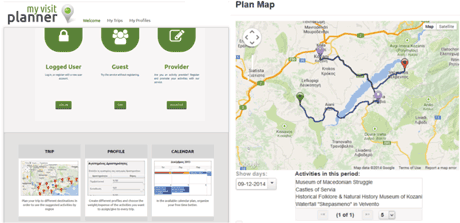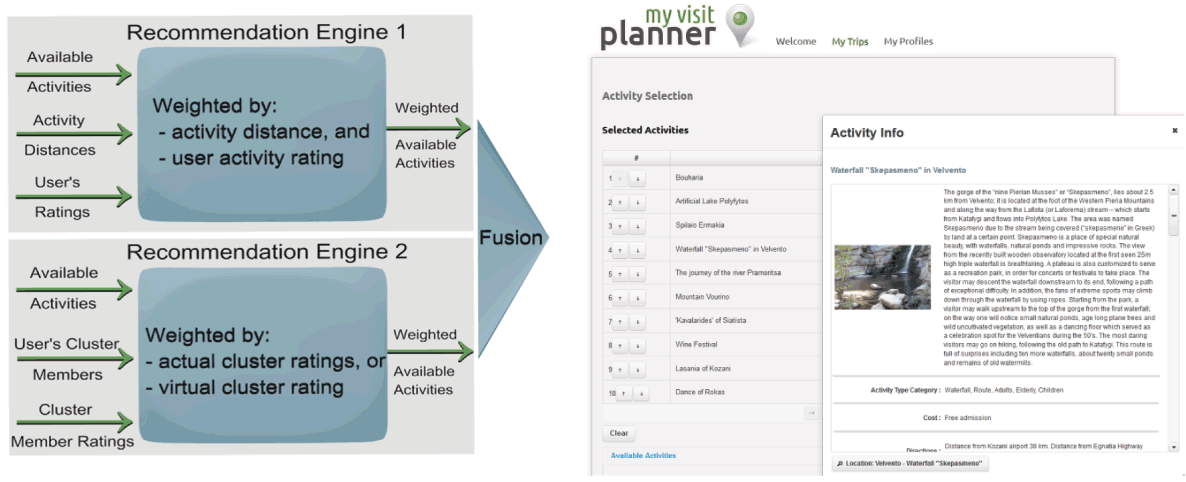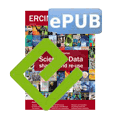by Ioannis Refanidis and Christos Emmanouilidis
Following the masses is one way of being a tourist. But the modern creative tourist is eager to forge a personal trail. Tailoring an itinerary to individual desires has always been the realm of highly specialized tour operators. Context-aware computing and recommender systems make it possible to offer personalized services in tourism. MYVISITPLANNER is a cloud-based service employing a recommender engine to offer personalized suggestions for tour activities and a planning tool to create appropriate tour itineraries. Recommendations are offered on the basis of a hybrid approach that takes into account both a taxonomy of possible activities, as well as user preferences and past recommendations, thus offering recommendations tailored to the visit profile [1].
A creative tourist is a traveller who is not simply satisfied with visiting top-10 attractions but seeks to enjoy a personal experience when visiting a place. Whether the visit involves outdoors activities off the beaten track or certain cultural preferences, an individual traveller is often a more demanding tourist but also one that intends to better blend with local culture and people when travelling. The personalization of the tourist product can now be achieved by advanced computer-assisted tourism services.
Visitors may obtain: (i) activity recommendations contextualized by the time, duration and area of a visit, as well as by personal preferences and visit profiling; and (ii) tour itineraries created by a world-class scheduler, on the basis of the offered recommendations, while taking into account individual visitor calendar constraints and scheduling preferences, as well as available time for the visit. Activity providers can benefit from having their services enlisted and included in the itineraries recommendations (Figure 1).

Figure 1: MYVISITPLANNER itinerary recommender.
While many recommender systems base their recommendations on either distance-based retrieval principles or collaborative filtering performed over past evaluations, the MYVISITPLANNER cloud service employs a hybrid recommender engine that fuses both approaches and is thus able to offer relevant recommendations even in the absence of historical data and past user evaluations feedback (Figure 2).

Figure 2: Recommendation engine principle and interface for reviewing recommendations.
In the absence of past visit data, the recommendations are based on a dedicated activities ontology. Specifically, a new visit profile is mapped on the activities ontology and, based on a dedicated distance function, relevant recommendations are retrieved. Past user evaluations are handled by hybrid clustering performed over the cloud employing the Mahout cloud-oriented machine learning library. Special care is taken so that privacy-preserving data management is involved: visit profiling is preferred instead of user profiling, avoiding handling sensitive private data. The user has the option of editing the recommendations by removing activities or including activities that were not originally recommended.
In order to produce plausible plans, the scheduler takes into account both the time and space constraints imposed by the selected activities and the user’s other commitments, as well as the user preferences for: (i) specific activities, (ii) the pace of the visit (e.g. relaxed or thight plan), (iii) activity duration (typical, minimum, maximum), (iv) free time scheduling, and (v) night time rest.
The scheduler produces several qualitative, significantly different alternative plans, for the user to choose from. The plan can be exported to the user’s calendar.
Default options are set for users not seeking a high level of personalization and seeking to minimize the time spent on producing a plan. The service is pilot-tested with stakeholders in Northern Greece and can create whole area (as opposed to city-only) visit itineraries.
The research is conducted by a partnership between academic and research institutions (University of Macedonia, ATHENA Research and Innovation Centre) and private commercial (Gnomon Informatics) and not-for-profit (Ethnological Museum of Thrace) organizations, with support from Regional Development Agencies (Development Agency of West Macedonia), Greece.
The project is supported by the General Secretariat of Research and Technology (GSRT/MIA-RTDI), Ministry of Education and Religious Affairs,Grant no. 09SYN-62-1129, under the national Operational Program “Competitiveness and Entrepreneurship (OPC II)” (NSRF 2007-2013).
Link:
http://www.myvisitplanner.com
Reference:
[1] I. Refanidis et al.: “myVisitPlannerGR: Personalised itinerary planning system for tourism”, in Artificial intelligence: methods and applications, A. Likas, K. Blekas, and D. Kalles, eds. (Springer), pp. 615-629.
Please contact:
Ioannis Refanidis, (Project co-ordinator)
University of Macedonia, Greece
Tel: +302310891859
E- mail:
Christos Emmanouilidis
Athena Research and Innovation Centre, Greece
Tel: +302541078787
E-mail:











